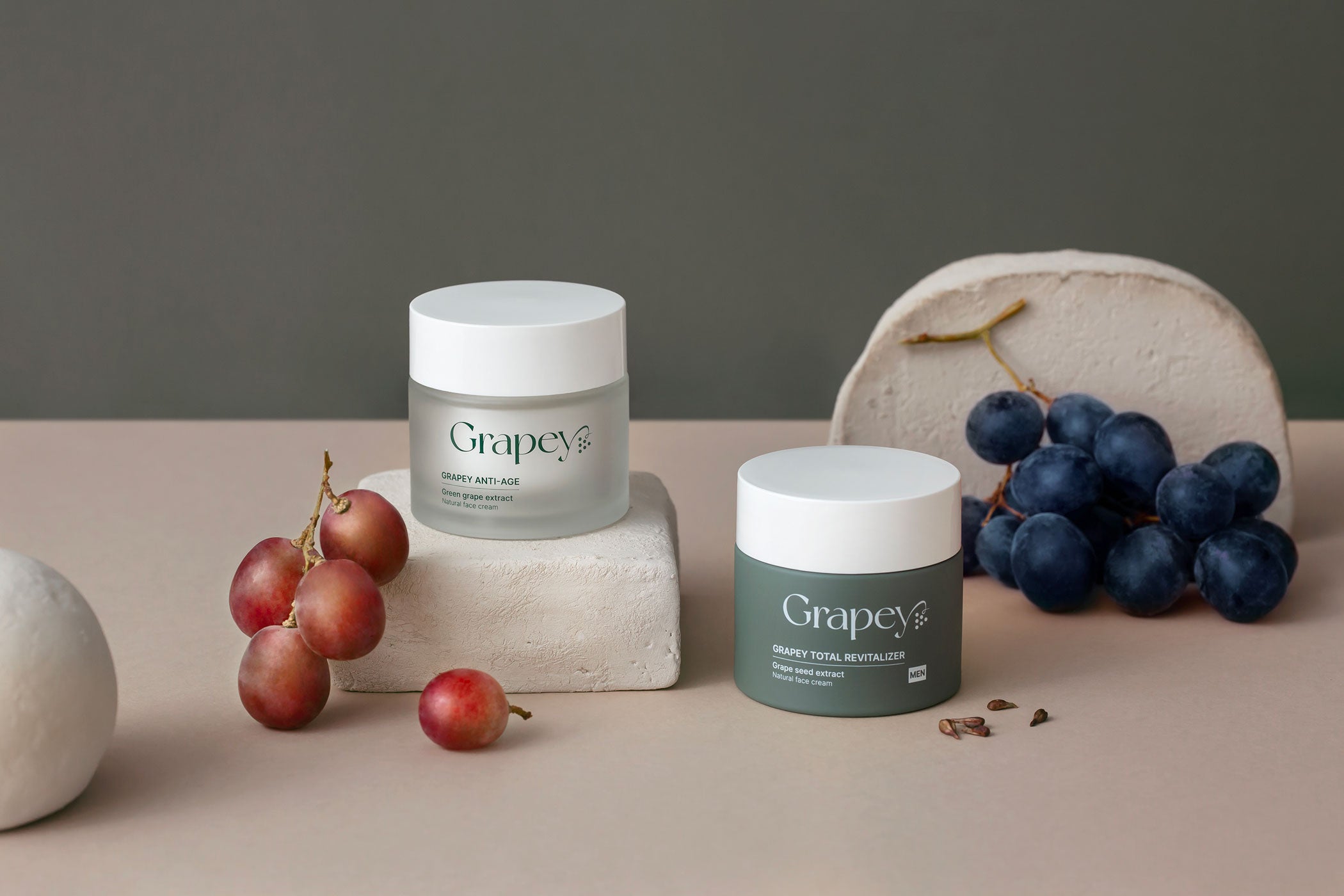Dark skin: characteristics and how to treat it | Grapey

How do light and dark skin differ?
Light and dark skin are different from each other. Knowing their differences is essential for treating them in the correct way. In this article, we will cover everything you need to know.
1. What is the structure of dark skin like?
In the epidermis of dark skin, the surface hydro-lipid film is, on average, richer in fatty acids compared to light skin. Additionally, the stratum corneum is more compact and thicker. Moreover, the melanosomes (involved in melanin production) are also found in keratinocytes (superficial skin cells), dispersed and larger in size. In contrast, there are no differences between light and dark skin regarding the number, distribution, and morphology of melanocytes. Even the dermis and subcutaneous tissue do not show significant differences. In dark skin, the sebaceous and sweat glands are more widespread, numerous, larger, and hypersecreting. Lastly, hair is less abundant.
2. What is the cause of skin color?
The different skin color and its varying intensity are due to the specific anatomy of melanosomes. This distinct anatomy implies different physiology. In other words, skin color is determined by the quantity, size, and distribution of melanosomes, which are cellular structures responsible for producing melanin, the pigment that gives color to the skin. In individuals with darker complexions, melanosomes are generally more abundant, larger, and evenly distributed compared to those in people with lighter complexions. Therefore, they produce a greater quantity of melanin.
3. Are there skin conditions that dark skin is more susceptible to?
There is a different incidence and/or clinical presentation of some skin diseases between dark and light skin. For example, rosacea is less common in dark skin, while vitiligo is more frequent. Erythema, which appears as redness, ranging from pink to bright red, on light skin, takes on a grayish color on dark skin. Science has shown that most skin diseases that appear on dark skin are the same as those observed on light skin. There are no specific skin diseases; instead, they represent different manifestations of the same conditions.
4. How does dark skin react to sun exposure and UV rays?
Dark skin reacts differently to sun exposure and UV rays compared to light skin, primarily due to the amount of melanin present. Melanin is the pigment responsible for skin color and plays a crucial role in protecting against UV radiation damage. In general, the more melanin there is, the greater the protection against UV radiation.
This difference in melanin means that dark skin requires a significantly longer exposure time to synthesize vitamin D compared to light skin. For example, to obtain the same amount of vitamin D, dark skin may require up to 12 times the exposure time to UVB rays compared to light skin. This can be attributed to the fact that only 2-5% of UVB rays can penetrate the epidermis of dark skin, while in light skin, this percentage is much higher, ranging from 20% to 30%.
5. Do different cosmetic products are needed for those with dark skin?
Different cosmetic products based on skin color are not necessary. However, there are some considerations to keep in mind:
1. Sunscreen: Since dark skin may be more resistant to UV damage compared to light skin, some people might underestimate the importance of sunscreen. However, UV protection is essential for all skin types to prevent photoaging and the risk of skin cancer. Regardless of skin color, it's important to use a good sunscreen when direct exposure to the sun is expected. In the summer, using products with natural UV protection, like the Grapey line, which contains natural anti-UV active ingredients, can be sufficient.
2. Hydration: Dark skin can tend to be drier in certain areas, so it's important to maintain good hydration with moisturizers suitable for your skin type.
One of the main characteristics of dark skin is a tendency to be drier in specific areas compared to others. This dryness may be particularly noticeable in some body areas, including:
- Elbows and knees: These areas tend to become drier and thicker on dark skin. This can make the skin rough and prone to keratosis pilaris.
- Heels: Heels are another common area where dark skin can become dry and thick. This can lead to calluses or cracking.
- Feet: The skin on the feet, especially on the heels and under the toes, can also become dry on dark skin.
- Lips: Lips can also tend to dry out more easily on dark skin, requiring good hydration.
Special care is needed in these areas for proper skin hydration, using highly moisturizing products formulated with specific active ingredients. Grapey offers facial creams for women and one for men with high moisturizing properties. They are formulated with grapeseed oil and enriched with panthenol, the stable form of vitamin B5 with strong moisturizing and soothing effects, making them suitable for even sensitive skin.

Why Grapey Creams are Your Best Allies for Skincare
Grapey creams are your best allies for skincare for several reasons. First and foremost, these creams are formulated with natural ingredients, including grapeseed oil, which offers numerous benefits for the skin. Here's why they are an ideal choice for your beauty routine:
High-Quality Natural Ingredients: Grapey Creams are formulated from organic grapes and enriched with grapeseed oil, a powerful natural extract known for its antioxidant and anti-aging properties. This high-quality ingredient is rich in essential nutrients that help improve skin elasticity and firmness.
Suitable for All Skin Types: Grapey Creams are formulated to suit all skin types, including dark skin. This makes them versatile and suitable for a wide range of dermatological needs. They are light and low viscosity, perfect for those who want quick absorption and for those who need extra hydration with a richer application.
Deep Hydration: Hydration is essential for healthy skin. Grapey Creams provide deep hydration that helps keep the skin soft, elastic, and well-moisturized. This is particularly important for people with dark skin who may experience dryness in certain areas of the body.
UV Protection: Grapey Creams offer natural UV protection thanks to grape-derived extracts with shielding properties. This natural protection helps prevent sun-induced skin damage, contributing to maintaining healthy skin.
Sustainable Products: Grapey Creams are environmentally friendly. They are vegan and derived from organic grapes, packaged in recyclable containers, with the option of a refill that can be reused indefinitely.
Wrinkle Prevention: Thanks to the antioxidant properties of grapeseed oil, Grapey Creams help prevent skin aging and the appearance of wrinkles. This is especially relevant if you want to maintain youthful and radiant skin, regardless of your age, and ensure anti-aging protection.

F.A.Q.
Answers to your questions
To what types of skin are Grapey creams suitable for?
Our creams are suitable for all skin types because they nourish without weighing down. They are particularly perfect for normal, oily, and combination skin. Additionally, they have passed all clinical tests for sensitive skin.
How long until I see the first results?
Consistency is crucial: with regular applications, morning and evening, your skin will be visibly brighter and more vibrant after approximately 3-4 weeks of use.
How often should I moisturize my skin?
Hydration should become a part of your daily routine. Apply a moisturizer at least twice a day, morning and evening, paying special attention and using an adequate amount of product in the drier areas. This will help your skin stay healthy, hydrated, and prevent aging.
How long do Grapey creams last?
Our creams are lightweight and have low viscosity: by applying them twice a day, the face cream lasts for about 3 months.
How does the refill work?
You can purchase the cream refill and reuse the glass jar. This way, you save money, and the environment thanks you.
